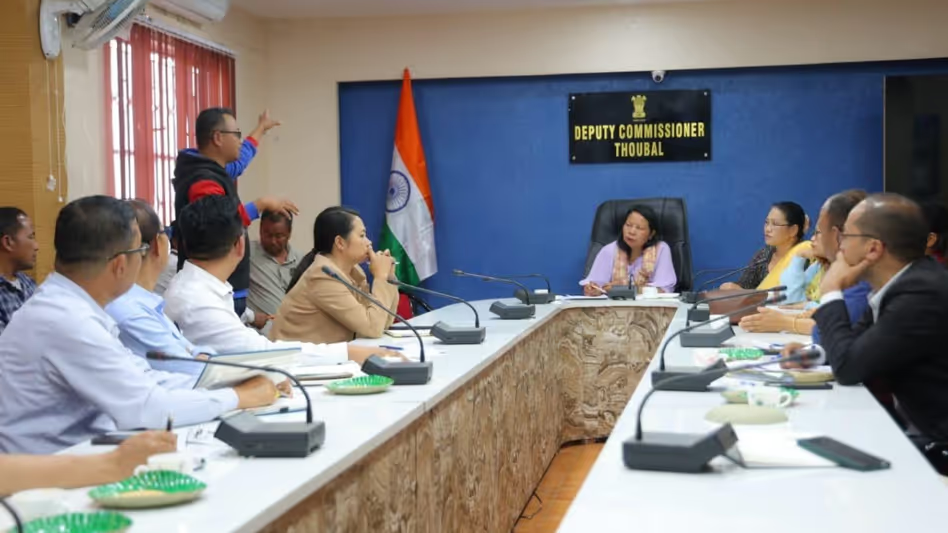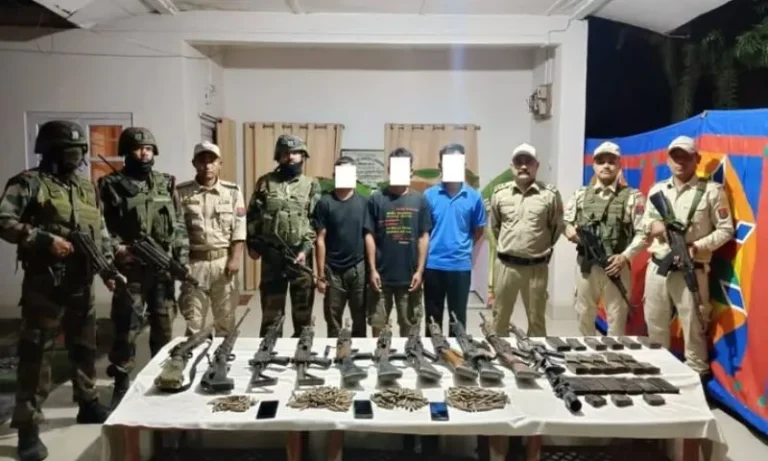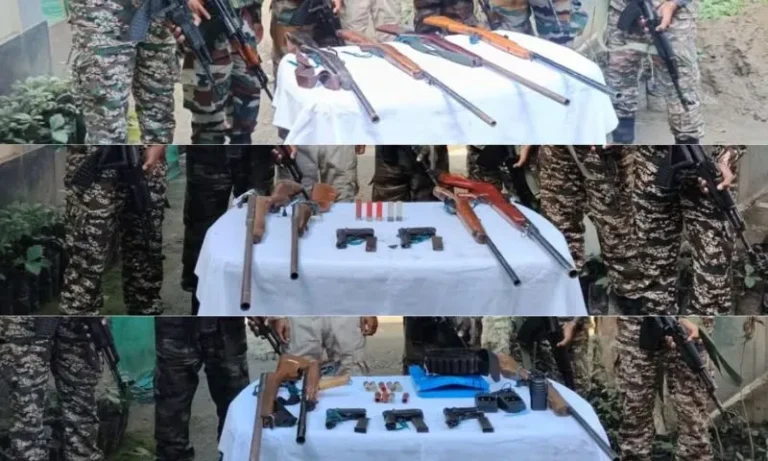Assessing the Plight of Internally Displaced Persons in Thoubal, Manipur
Summary of the News Article:
On March 19, 2025, the Manipur State Commission for Women (MSCW), in collaboration with the Thoubal District Administration, held a camp at the Conference Hall of the DC Thoubal Office Complex. This initiative aimed to evaluate the living conditions of Internally Displaced Persons (IDPs) and women affected by recent conflicts. MSCW representatives expressed deep concern over the hardships faced by women in relief camps and urged government departments to ensure their essential needs are met. The Commission also emphasized the importance of awareness programs and skill development training to help displaced individuals sustain their livelihoods.
The Unseen Struggles of Manipur’s Internally Displaced: A Deep Dive into Thoubal’s Humanitarian Crisis
Introduction
Imagine waking up one day to find that the place you call home is no longer safe. The familiar streets, the comforting neighbors, and the cherished memories—all overshadowed by the looming threat of violence. This unsettling reality has become the daily life for many in Manipur, particularly in the Thoubal district. The recent ethnic conflicts have not only disrupted lives but have also led to a significant number of Internally Displaced Persons (IDPs) seeking refuge within their own state. Let’s embark on a journey to understand their plight, the challenges they face, and the efforts being made to restore their dignity.
The Genesis of Displacement in Manipur
Manipur, often referred to as the “Jewel of India,” has a rich tapestry of cultures and traditions. However, beneath this vibrant facade lies a history marred by ethnic tensions and conflicts. The recent surge in violence has its roots in longstanding disputes over land, identity, and political representation. These conflicts have escalated to such an extent that many have been forced to flee their ancestral homes, seeking safety in relief camps scattered across districts like Thoubal.
Thoubal: The Epicenter of Hope and Despair
Thoubal, known for its historical significance and scenic beauty, has become a sanctuary for many IDPs. The district’s administrative machinery, led by Deputy Commissioner A. Subhash Singh, has been proactive in addressing the crisis. In collaboration with organizations like the MSCW, the district administration has organized camps to assess and improve the living conditions of those displaced.
Living Conditions in Relief Camps: A Glimpse into Daily Life
Stepping into one of these relief camps, one is immediately struck by the resilience of the human spirit. Families huddle together in makeshift shelters, children find moments of joy amidst the chaos, and community leaders strive to maintain a semblance of normalcy. However, beneath this resilience lies a plethora of challenges:
- Overcrowding: With the influx of displaced families, space has become a luxury. Many camps are operating beyond their capacity, leading to cramped living conditions.
- Sanitation: Limited access to clean water and sanitation facilities has raised concerns about the outbreak of diseases. The Public Health Engineering Department (PHED) is working tirelessly to address these issues, but the sheer volume of needs often outpaces resources.
- Healthcare: The Chief Medical Officer (CMO) of Thoubal has highlighted the pressing need for medical supplies and personnel. Common ailments, if left untreated, can escalate rapidly in such environments.
- Mental Well-being: The trauma of displacement, coupled with the uncertainty of the future, has taken a toll on the mental health of many. Counseling services are in place, but the stigma surrounding mental health often prevents individuals from seeking help.
Women and Children: The Most Vulnerable
In any conflict-induced displacement, women and children bear the brunt of the hardships. The MSCW’s involvement underscores the unique challenges faced by these groups:
- Safety Concerns: Overcrowded camps can become hotspots for gender-based violence. Ensuring the safety of women and children is a top priority, with dedicated patrols and support systems in place.
- Access to Essentials: Women often struggle to access essential hygiene products, leading to health complications. Initiatives are underway to distribute these necessities regularly.
- Education Disruption: For children, displacement means an abrupt halt to their education. Temporary learning centers have been established, but the quality and consistency of education remain concerns.
Economic Implications: From Self-sufficiency to Dependency
Many of the displaced were once self-reliant, with livelihoods rooted in agriculture, craftsmanship, or trade. Displacement has stripped them of these means, pushing them into a state of dependency:
- Loss of Livelihoods: Fields lie fallow, shops remain shuttered, and tools gather dust. The economic backbone of these families has been severely compromised.
- Skill Development: Recognizing this, the District Administration, in collaboration with NGOs, has initiated skill development programs. These aim to equip IDPs with new skills, from weaving to digital literacy, enabling them to find alternative income sources.
Community and External Support: A Beacon of Hope
The crisis has also highlighted the strength of community bonds and the generosity of external entities:
- Local NGOs: Organizations like the Rural Women Upliftment Society (RWUS) have been at the forefront, providing essential supplies, counseling, and advocacy for the displaced. neherald.com
- Government Initiatives: The Manipur State Commission for Women Rules, 2024, has laid the groundwork for more structured support for women in distress. manipurgovtpress.nic.in
- Public Awareness: Media outlets have played a crucial role in bringing the plight of the displaced to the forefront, prompting both governmental and public responses.
Challenges Ahead: Navigating the Road to Rehabilitation
While immediate relief is crucial, long-term rehabilitation poses significant challenges:
- Reintegration: Facilitating the return of IDPs to their native places requires not just rebuilding homes but also restoring trust and ensuring security.
- Economic Rehabilitation: Beyond immediate aid, sustainable economic opportunities must be created to prevent prolonged dependency.
- Mental Health Support: Long-term counseling and community support systems are essential to address the deep-seated trauma experienced by many.
Conclusion: A Collective Responsibility
The situation in Thoubal is a poignant reminder of the fragility of peace and the profound impact of conflict on innocent lives. However, it also showcases the indomitable spirit of communities and the power of collective action. As stakeholders—from government bodies to local communities—come together, there lies hope that the displaced will not just survive but thrive, rebuilding their lives with dignity and purpose.
Frequently Asked Questions (FAQs)
- What are the main challenges faced by IDPs in Thoubal?
The key challenges include overcrowded shelters, inadequate access to clean water and sanitation, limited healthcare facilities, economic insecurity, and significant psychological stress. - How does the Manipur Women Commission contribute to addressing these issues?
The commission assesses living conditions, advocates for gender-sensitive policies, engages with affected communities, and works with government and NGOs to push for immediate relief and long-term rehabilitation. - What initiatives are being taken to improve healthcare for IDPs?
Efforts include setting up makeshift health centers, ensuring a steady supply of essential medicines, and proposing the development of permanent healthcare facilities specifically catering to the needs of displaced populations. - How important is community involvement in overcoming the crisis?
Community involvement is critical. It fosters mutual support, encourages grassroots initiatives, and ensures that relief measures are tailored to the actual needs of those affected, making the recovery process more sustainable. - What long-term solutions are being discussed to help IDPs reintegrate into society?
Long-term solutions focus on infrastructure development, economic empowerment through skill development and entrepreneurship, enhanced healthcare services, and robust policy reforms aimed at sustainable rehabilitation.




